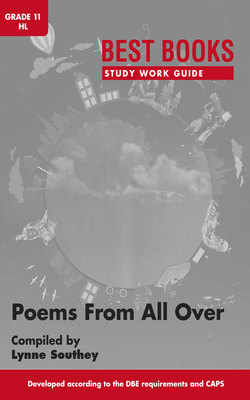Читать книгу Best Books Study Work Guide: Poems From All Over Gr 11 HL - Lynne Southey - Страница 20
На сайте Литреса книга снята с продажи.
The Weary Blues by Langston Hughes
Оглавление(See p. 33 in Poems From All Over)
| Title: | The music of early African Americans, born out of their struggles and suffering. |
| Theme: | The continuing struggle and suffering of the people. |
| Mood: | Resigned, long-suffering, sad. |
Discussion
When we say we have got the blues, we mean we are low, depressed, sad. This also signifies the slow, sad jazz music that originated with the descendants of slaves and expressed their suffering, just as did “Negro spirituals”, songs which came from an earlier time.
The speaker is telling about a “Negro” whom he heard and saw playing blues music on a piano. He describes the sound of the music and the movements of the player, and tells us what the music is about, and finishes with the piano player going to bed to sleep “like a rock or a man that’s dead”.
The poet uses elements of blues music, the slow sounds, the repetition, to evoke an idea of the music.
The poem reminds one of and points to the condition of the African Americans or “Negroes” as they were called, their sad history and the way they managed to cope with the life forced on them.
This poem was awarded best poem of the year in 1925 after appearing in the Opportunity magazine.
Analysis
| Lines | Comment | |
| 1–8 | The first two lines describe what the speaker hears and sees, and then the third identifies it.The next four lines say where and when, what was happening, and identify what the “Negro” (line 3) was playing. | The slow pace of the lines, the consonants and vowel sounds, illustrate the sounds of blues music. Lenox Avenue is one of the main streets in Harlem, historically the African American part of New York. The gaslight points to the era, before Harlem had electricity. The speaker introduces himself with “I”, thus providing a narrative perspective: this is what I heard and saw. The reference to “those Weary Blues” (line 8) suggests a known form of music that the speaker recognises. |
| 9–16 | The player is identified as an African American (“his ebony hands”; “black soul”) which links with “Weary Blues”. The piano is old (“poor”) and so is the stool (“rickety”). The tune is “sad raggy” and in line 13 “melancholy”, confirming the mood of blues music, and identifying it as the expression of a black “soul”. | Note the contrast: one normally talks about the ivory and ebony of the black and white keys of a piano; here it is the black hands of the player that are ebony. The pianist, a black man, is using an instrument from white culture and is using it to express his own culture.Note the repetition, like the chorus or repetitive refrain of a song. Also note the alliteration (repetition of initial consonants) in line 10 that mimics the sound of the music.Line 14 is repeated with the addition of “Sweet” signifying the comfort such music brings the suffering soul. |
| 17–22 | We are told that the piano player also sang in a sad voice and we are given the words of the song, in the idiomatic language of the people. | These lines, too, contain repetition. The words of the song express a loneliness but also a determination to stop wallowing in pity and to move on (“put ma troubles on the shelf”) (line 22). |
| 23–30 | The player gives the song rhythm by stamping his feet, playing a bit more without singing and then continuing to sing the words of the song. | The song’s words express a feeling of weariness or tiredness and depression, a lack of satisfaction in life, and the thought that death would be welcome and better than life. This is quite a serious statement of negativity to make. |
| 31–35 | The speaker’s voice resumes, telling us the musician went on until the early hours of the morning (“The stars went out and so did the moon”) (line 32) and then the singer finally stopped “and went to bed” with the sound and the emotion of the song still in his mind. But he slept soundly, or like someone dead. | The player/singer played and sang the same song well into the night, over and over. The repetitions throughout the poem link us with this. He seems finally satisfied or tired out and goes to bed to sleep well. |
Contextual questions
1.What elements of blues music do you find in this poem? (3)
2.What does “With his ebony hands on each ivory key” in line 9 tell us about the complexity of the music? (2)
3.What is emphasised with the words “pale dull pallor” to describe the gas light (line 5)? (4)
4.What do you understand by “musical fool” in line 13, and why is the player said to be like one? (3)
5.Identify the simile (comparison using “like” or “as”) in the last line and discuss its effect. (3)
(15)
| Enrichment activityResearch other blues songs and their words and compare them with this one, quoted in the poem. |
